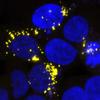 High levels of active misfolded proteins — the dead forms of which have long been targeted by researchers for gumming up the brain's signaling activity — may play a role in Alzheimer's disease, according to a study involving a Nobel Prize-winning UCSF scientist.
High levels of active misfolded proteins — the dead forms of which have long been targeted by researchers for gumming up the brain's signaling activity — may play a role in Alzheimer's disease, according to a study involving a Nobel Prize-winning UCSF scientist.
The discovery of so-called "prions" — which Dr. Stanley Prusiner of the University of California, San Francisco, dubbed the misfolded proteins more than three decades ago — potentially could focus researchers on new targets for the…



